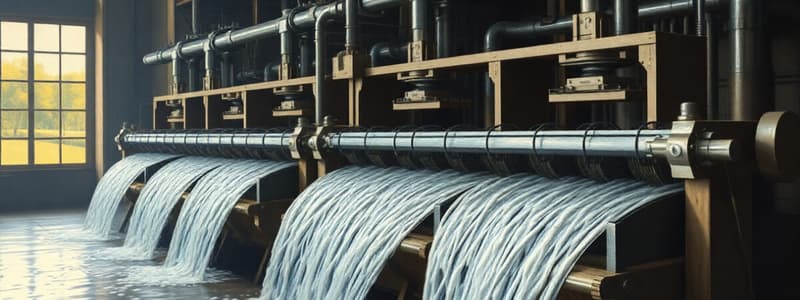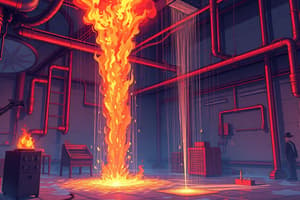Podcast
Questions and Answers
What is the primary function of automatic separators?
What is the primary function of automatic separators?
- To enhance manual cleaning processes
- To facilitate suction and aspiration (correct)
- To assist in filtration of liquids
- To increase energy consumption
Which component is NOT typically associated with automatic separators?
Which component is NOT typically associated with automatic separators?
- Suction mechanism
- Separation chamber
- Manual toggle switch (correct)
- Aspirating device
In which scenario would an automatic separator most likely be used?
In which scenario would an automatic separator most likely be used?
- To pump fluids into a storage tank
- To remove unwanted substances from a liquid (correct)
- To improve air quality in a room
- To clean surfaces with a cloth
Which characteristic is essential for effective operation of an automatic separator?
Which characteristic is essential for effective operation of an automatic separator?
What might be a consequence of using an inefficient automatic separator?
What might be a consequence of using an inefficient automatic separator?
Flashcards are hidden until you start studying
Study Notes
Primary Function of Automatic Separators
- Automatic separators primarily serve to separate different phases or components in a mixture, enhancing efficiency in processing systems.
- They are commonly used in industries such as oil and gas, wastewater treatment, and food processing.
Non-Associated Component
- Filters are typically NOT associated with automatic separators, as filters serve a different function focused on removing particulates rather than separating phases.
Usage Scenarios
- An automatic separator is most likely used in scenarios where continuous processing of mixtures occurs, such as separating oil from water or solid waste from liquid effluent.
Essential Characteristics
- Effective operation of an automatic separator relies on precise control mechanisms, enabling the separator to adjust to varying flow conditions and maintain optimal separation efficiency.
Consequences of Inefficiency
- Using an inefficient automatic separator may lead to product contamination, reduced quality of separated materials, and increased operational costs due to the need for additional processing or maintenance.
Studying That Suits You
Use AI to generate personalized quizzes and flashcards to suit your learning preferences.




